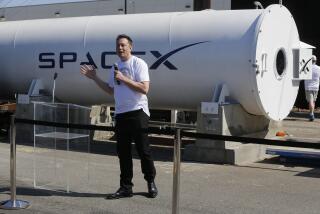N-Plant ‘Whistle-Blower’ Disillusioned : His $100-Million Lawsuit Against Bechtel Power Corp. Is Nearing Trial
- Share via
It has been nearly three years since Earl Kent became a nuclear industry “whistle-blower” after being fired from his job as a welding inspector at the now-dormant Midland, Mich., nuclear power plant.
And now, as a trial date nears in his $100-million wrongful-termination suit against San Francisco-based Bechtel Power Corp., Kent says he is not sure he has accomplished much. “And if I knew then what I know now,” he said, “I’m not sure I’d do it again.”
Kent, an Orange County resident, complained in secret testimony to the Nuclear Regulatory Commission in March, 1982, that he had been fired by Bechtel Power Corp., the prime contractor at Midland, because he was raising questions about the quality of the welding techniques used by Bechtel welders at both Midland and the San Onofre nuclear generating station in San Diego County.
Six months later, concerned that the NRC was doing little to investigate his charges, Kent went public in an interview with The Times. He said at the time that he was doing so in the hope of forcing the regulatory agency to order improvements in welding techniques used in construction of nuclear plants.
Kent still is waiting for the release of a report, prepared by Brookhaven National Laboratory in New York, that analyzed welds used at the Midland plant to determine whether Kent’s allegations of faulty welding at the plant were accurate. The report was commissioned early last year by the NRC’s regional office in Michigan.
Although Consumers Power Co., which began building the Midland generating station in 1972, mothballed the delay-plagued project last year as costs approached the $4-billion mark, Brookhaven forged ahead with its analysis and late last month sent its findings to the NRC. A spokesman at the agency’s Michigan regional office would not discuss the report but said it probably would be made public later this month.
Kent said he wants the report released even though he doubts it will support him. He is convinced the NRC has cooperated with Bechtel and the power companies to dismiss him as a crank.
In California, Kent’s allegations about faulty welding at two of San Onofre’s three generating units were dismissed by Southern California Edison Co., operator and majority owner of the power plant; by Bechtel, which built it, and by the NRC’s Region 5 office in Walnut Creek, which is responsible for inspecting and regulating nuclear reactor construction in the western states. An internal NRC investigation by the agency’s Washington, D.C.-based Office of Inspector and Auditor, completed a year ago but not released until a request was made under the federal Freedom of Information Act, subsequently found that Region 5 officials were guilty of “procedural and administrative shortcomings” in their investigation of Kent’s allegations about welding at San Onofre.
Among the shortcomings described in the abridged version of the OIA report (the NRC refused to release 16 of the 32 documents in the file) was the conduct of an October, 1982, on-site inspection at San Onofre during which Kent was supposed to point out and explain specific welding problems to personnel from Bechtel, Southern California Edison and the NRC. During the inspection, however, Kent was denied access to ladders, measuring equipment, inspection tools or other implements.
The OIA report, which found no reason to question the Region 5 office’s findings that Kent’s allegations were groundless, was prompted by pressure from several members of Congress, as well as from the Government Accountability Project, a private legal clinic in Washington that works with nuclear industry whistle-blowers like Kent.
A Bechtel spokesman said the company’s position in the lawsuit is that Kent’s termination “had nothing to do with retribution” for Kent’s allegations. “He was terminated because he failed to pass a required test,” the spokesman said. Kent has said that the test he failed at Midland was a subjectively graded oral portion of a competency exam given to Bechtel’s welding inspectors. He maintains that he passed virtually identical exams given at two other Bechtel-built nuclear plants and failed at Midland only because his supervisors wanted to fire him.
Kent, a welding engineer with more than 40 years of experience and excellent reviews from almost all of his previous employers, spent 16 months trying to find a permanent job after being fired by Bechtel. He lost his Cypress home in a foreclosure sale last August, has had numerous other financial problems and was separated from his wife for a time, largely, he said, because of the stresses the marriage underwent after he became a national news figure.
Kent, who lives in Costa Mesa, now works as a welding and structural engineer and inspector for Hydro-Electric Constructors of Orange, a small company specializing in hydroelectric power plants.
Kent’s lawyer, Paul Monzione--an attorney with Melvin Belli’s law firm in San Francisco--said a trial-setting conference is scheduled April 1 and that he believes the lawsuit could be under way within a couple of months after that.
Monzione said Bechtel attorneys have taken seven lengthy depositions from Kent and have been crisscrossing the country to interview Kent’s friends, family and former employers in an attempt to find support for their contention that he is a malcontent.
“This has taught me a tremendous lesson,” Kent said. “I never realized people could be crushed like this for speaking out.”
More to Read
Inside the business of entertainment
The Wide Shot brings you news, analysis and insights on everything from streaming wars to production — and what it all means for the future.
You may occasionally receive promotional content from the Los Angeles Times.










